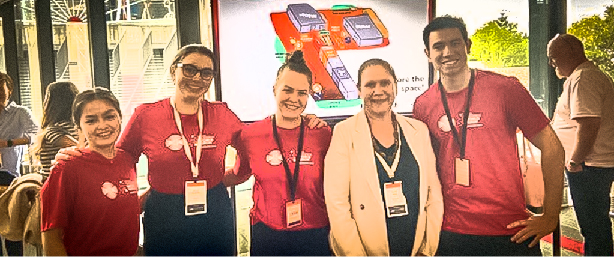
Last week the Murawin team attended the Social Enterprise World Forum (SEWF) co-hosted by our co-locaters, White Box Enterprises. The forum saw around 3000 people connect both online and in person on Turrbal Country to build the community, capacity, and capability within the social enterprise sector. The 2022 forum focused on themes of Indigenous Social Enterprise, Climate Solutions and Youth. Here are three things our team took away from the forum:
1. Give Young People a Voice
Murawin’s Interns and ‘younger’ staff volunteered at the Social Enterprise Youth Forum sessions where young entrepreneurs were sharing their story and helping others find theirs. Through the workshops and panels, it was increasingly clear that youth are deeply driven to have a seat at the table on issues effecting their future. Young people want to engage in dialogue about social problems and their voice is worth listening to. Youth as young as 11 were sharing their passions for social impact, and how they are creating the change they want to see in the world, which tomorrow is theirs.
2. Indigenous Business Closing the Gap
As a key theme of SEWF 2022 was Indigenous Social Enterprise, the forum solidified Murawin’s approaches and position on Indigenous business being key to closing the gap. Indigenous businesses are more likely to employ Indigenous people, in turn helping to close the gap with employment, housing, and economic freedom for First Nations people. Indigenous businesses don’t just contribute to our society’s economy but additionally enriches us socially and culturally. Our team was lucky to connect with other Indigenous businesses via the forum.
3. Doughnut Economics Modernises Economics
Doughnut Economics founder Kate Raworth participated in a fireside chat discussing what it is and its impact on the global economy. This process is a way of working that First Nations people across the world have been doing for generations. This economic model is not only circular, but has a social foundation, to ensure that no one is left falling short on life’s essentials, and an ecological ceiling, to ensure that humanity does not collectively overshoot the planetary boundaries. Doughnut Economics addresses the disconnect between 21st century goals and 20th century thinking. It highlights our need for a shift in economic mindset required to rebuild our economic framework. ‘If the 21st century goal is to meet the needs of all people within the means of the living planet, how can humanity get there? Not with last century’s economic thinking’.
Check out the website for more: About Doughnut Economics
